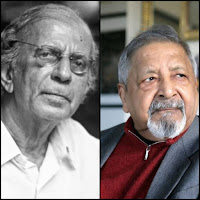NAIPAUL'S INDIA AND MINE - NISSIM EZEKIEL

NAIPAUL'S INDIA AND MINE - NISSIM EZEKIEL Synopsis 1. Author introduction and critical reviews 2. Examining Naipaul's India and Mine 3. Analysis 4. Contrasting Naipaul's and Nissim Ezekiel's India 5. Conclusion AUTHOR INTRODUCTION AND CRITICAL REVIEWS -Gayathri K Nissim Ezekiel called “the father of independence Indian verse in English". He establish himself as a towering figures of Indian English poetry . Theme in Nissim Ezekiel poems majorly focus on Indian identity, superstitions, Love. In his poem “Poet, Lover and Birdwatcher”. He highlights his poetic style in this way: “The best poets wait for words, The hunt is not an exercise of will". William Walsh also remarks about the technique of Ezekiel when he says that “Ezekiel poetry more than that of any other of these writers (Indian English poe...


